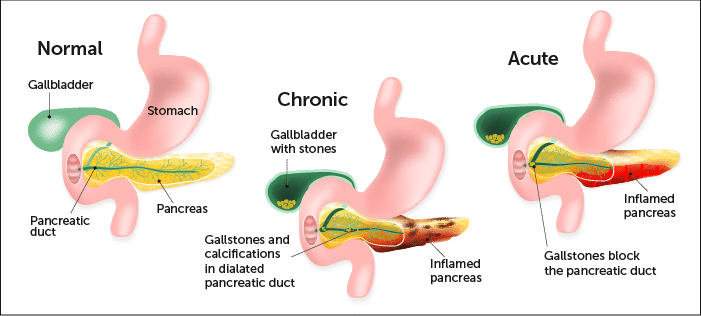
A person suffering from pancreatitis has an inflamed pancreas. The pancreas is a large gland behind our stomach and next to our small intestine. It aids in digestion by releasing powerful digestive enzymes into the small intestine and causes insulin and glucagon to be released into the system. These hormones assist our body in controlling how it utilizes food and energy.
Read on to know more about pancreatitis, its types, symptoms, diagnosis, treatment, etc.
Types of Pancreatitis:
There are two types of Pancreatitis – Acute, and Chronic.
Acute type causes sudden inflammation in the pancreas but lasts for a short time. It might range from a minor ailment to a serious and life-threatening condition. However, after receiving proper treatment, one can completely recover from acute pancreatitis. Chronic pancreatitis, on the other hand, causes long-term inflammation of the pancreas. Acute pancreatitis, if not treated properly, can lead to chronic pancreatitis. Excessive consumption of alcohol can also leads to the symptoms of pancreatitis.

Symptoms of Pancreatitis:
A person might experience different symptoms for acute and chronic pancreatitis.
Symptoms of Acute Pancreatitis include:
- Fever
- High Heart rate
- Nausea
- Vomiting
- Swollen and Tender Belly
Symptoms of Chronic Pancreatitis include:
- Ceaseless pain in your upper belly
- Weight loss
- Upset stomach
- Vomiting
Diagnosis
If someone observes the symptoms mentioned above, it is essential to consult a pancreas specialist and get themselves diagnosed. Doctors might need your medical history, a physical exam, lab, and imaging tests to conduct a diagnosis of the disease. The doctor will inquire about your symptoms, current medications you are taking, and look for health issues and conditions that might increase your risk of pancreatitis.
Various tests and procedures are conducted to diagnose pancreatitis, including blood tests, stool tests, Computerized tomography (CT) scans to search for gallstones and assess the degree of pancreas inflammation. The health care provider might also conduct Endoscopic ultrasound to check inflammation and blockages in the pancreatic duct or bile duct.
Treatment
Antibiotics are the main course of action that helps in the treatment of Pancreatitis to a great extent. Apart from this, Intravenous (IV) fluids will be administered to your body through a needle. Since you might face difficulty digesting food, you will be only given nutrition fluids through a feeding tube. If you are diagnosed with severe pancreatitis due to gallstones, the doctor might have to conduct surgery to take it out from your pancreas.
Prevention and Precaution
There are always some ways to eliminate the chances of having a disease. Even if the disease is notable, you can prevent it from becoming worse by following a healthy lifestyle, that includes:
- Avoid alcohol
- Eliminate smoking
- Exercise regularly
- Maintain a good Body Mass Index (BMI)
- Work towards better sleep quality
Mentioned above is a list of the symptoms, treatment, diagnosis, and things you need to know about Pancreatitis. However, if you are suffering from pancreatitis, it is advisable to consult the best pancreas specialist in Delhi, whether you are living in Delhi, Kolkata, Pune, Mumbai, or anywhere in India, to get the best results and treatment plan.






























